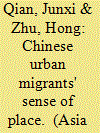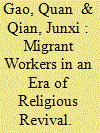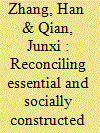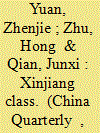|
|
|
Sort Order |
|
|
|
Items / Page
|
|
|
|
|
|
|
| Srl | Item |
| 1 |
ID:
132408


|
|
|
|
|
| Publication |
2014.
|
| Summary/Abstract |
In this paper, we study urban migrants' sense of place in Guangzhou, China, focusing on the structural relations between place attachment, identification and dependence as the three key place dimensions. Through both quantitative structural equation modelling and qualitative analysis of in-depth interviews data, our research suggests that migrants' sense of place demonstrates complex relationships between the three registers of emotional attachment, identity formation and functional dependence. The construction of sense of place is also related to the personal experiences of living as urban 'outsiders'. Our research also reveals a striking difference between the city and community levels in terms of the ways in which migrants' sense of place is constructed. Urban migrants tend to exploit the functional utilities of microscopic urban spaces to meet their demands for recreation, education and socialisation. On the other hand, their sense of place to the city is largely compromised by their attachment to the hometown and conditioned by their personal identification to the city.
|
|
|
|
|
|
|
|
|
|
|
|
|
|
|
|
| 2 |
ID:
173458


|
|
|
|
|
| Summary/Abstract |
In the reform era, China appears to be caught in a contradictory dual process – the entrenchment of secular values and simultaneously, the notable revival of all forms of religion. However, the existing literature has achieved limited success theorizing how the thriving of faiths constitutes, and co-evolves with, secular modernity and capitalism. This article contributes to this re-theorization by bringing migration, labour and industrial capitalism to bear on faith and religious practices. Our empirical study in Shenzhen focuses on the formation of rural-to-urban migrant workers’ Christian faith. We examine the ways in which migrant workers manoeuvre religion as a cultural, symbolic and discursive resource to come to terms with, but also sometimes to question and counteract, the double exploitation enforced by state regulation and labour relations. In the meantime, however, this article also argues that migrants’ efforts in self-transformation through the discourses of benfen and suzhi, and their theologically mediated interpretation of alienation, labour exploitation and social inequality, overlap with, and reinforce, the agenda of producing docile, productive bodies of migrants, an agenda endorsed by the state–capital coalition. This research opens new opportunities for theorizing how capitalist secularity and religious orientation implicate one another in the current Chinese society.
|
|
|
|
|
|
|
|
|
|
|
|
|
|
|
|
| 3 |
ID:
187011


|
|
|
|
|
| Summary/Abstract |
In post-reform China, Han Chinese urbanities traveling to Tibet have contributed to a new literary genre that documents tourist mobility as a means of self-finding and self-exploration. The sample of data in this study consists of 28 book-length travel writings by Han travellers, and the primary research question addresses the relationships between tourism mobility and self-making, a widely debated issue in cultural and tourism geographies. Engaging with the conceptual tension between an essential self and a socially constructed self, this study argues that while Han writers' travels to Tibet are germane to the hunt for an essential self as a hidden treasure to be redeemed, the self is by no means merely introspective, but intrinsically relational and constituted by social, embodied and materially mediated practices. For the purpose of reconciling and synthesizing the two theoretical positions, this study proposes an alternative concept known as the ‘assemblage self’, which tries to capture how the more-than-human and more-than-representational dimensions of mobilities can speak back powerfully to the phenomenology of the self. This concept is relational and performative in the sense that it is constituted by networks of discourses, practices, and materialities. We develop this concept by engaging with the recent literature on more-than-representational mobility as a conceptual nexus connecting the concepts of the essential self and the socially constructed self.
|
|
|
|
|
|
|
|
|
|
|
|
|
|
|
|
| 4 |
ID:
156611


|
|
|
|
|
| Summary/Abstract |
The Xinjiang Class (Xinjiang neidi ban, or Xinjiangban) has far-reaching implications for Beijing's governance of ethnic minorities in Xinjiang. Existing literature has focused primarily on the Uyghur–Han dichotomy, with limited attention being paid to the actual multi-ethnic interactions that constitute the situated dynamics of policy implementation. Utilizing the notions of the space of prescription and the space of negotiation to develop an analytical framework, this paper argues that social relations in the Xinjiangban are ongoing constructions borne by everyday experiences of domination and negotiation, and that space is constitutive of this situated dynamic. Based on nearly four years of research at a Xinjiangban, we make a case for the fluidity and incoherence of the implementation of the Xinjiangban policy. Those who implement it at the school level produce a space of prescription that deploys specific spatial–temporal arrangements to manage expressions of ethnic identity. Driven by the need to achieve upward mobility, minority students are open-minded about the Han- and patriotism-centred education. However, they use innovative and improvised tactics to create spaces of negotiation to re-assert their ethnicities. In the Xinjiangban, minority students do comply with spaces of prescription, but they simultaneously keep their ethnic and religious practices alive.
|
|
|
|
|
|
|
|
|
|
|
|
|
|
|
|
|
|
|
|
|